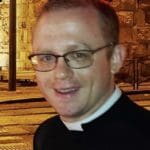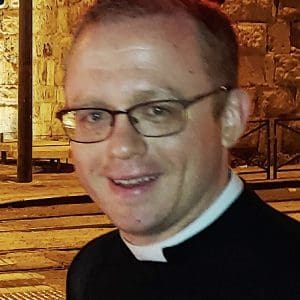One of the things that scared me when I was a little boy was being caught down in the basement with no light. Sometimes my brother, my sister, and I would occasionally tease each other and shut off the basement lights when we were down there playing. What frightened me the most about this action when I was little was the darkness, the inability to see where I was going and the fear of being overcome by unknown obstacles and dangers that I was blinded from seeing.
Not being able to see what is around me or where I am going or being blinded by my perceptions and experience is a danger that is constant to both human existence and the way of faith with Jesus. Within the history and tradition of the Church this struggle has been met through accompaniment and formation through spiritual direction. Whether it was with the monks of the desert or the great spiritual directors who guided great saints such as Saint Teresa of Avila, Saint Margaret Mary Alacoque, Saint John of the Cross, and Saint John Paul II and countless souls known or unknown, spiritual direction is a particular pastoral need in everyone’s walk with Jesus in their lives. Authentic accompaniment in spiritual direction helps a person find Jesus not only working in the events and circumstances in their lives but in the very depths of their heart.
Every disciple of Jesus is thereby called to spiritual direction in some way, shape, or form in order for them to become who God made them to be. Pope Benedict XVI reiterates this point:
“Today the Church continues to recommend the practice of spiritual direction not only to those who desire to follow the Lord closely but to every Christian who wishes to live responsibly his or her Baptism, that is, new life in Christ.” (Address To The Community of the Pontifical Theological Faculty “Teresianum” of Rome, May 19, 2011)
Pope Francis also reiterates this point:
“Spiritual direction is not an exclusive charism of the priesthood: it’s a charism of the laity! In early monasticism lay people were the great directors…When the superiors see that a man or woman in that congregation or that province has that charism of a spiritual father, they must try to help them to be formed, to perform this service. It is not easy. A spiritual director is one thing and a confessor is another thing. I go to the confessor, I tell my sins, I feel the flogging; then he forgives me of everything and I go ahead. But I must tell the spiritual director what is happening in my heart. The examination of conscience is not the same for confession and for spiritual direction. For confession, you must search where you have fallen short, whether you have lost patience; if you have been greedy: these things, concrete things, which are sinful. But for spiritual direction, you must examine what has happened in the heart; such as the movement of the spirit, whether I have been desolate, if I have been consoled, if I am tired, why I am sad: these are the things to speak about with a spiritual director.” (Address to the Consecrated Men and Women of the Diocese of Rome, May 16, 2015; See also Gaudete et Exultate: Apostolic Exhortation on the Call to Holiness in Today’s World, March 19, 2018, n. 25-34, 169-175)
Everyone is called to spiritual direction seasonally according to various times and circumstances in their lives and some members of Christ’s faithful are even called to permanent, life long, spiritual direction. This is also confirmed by the fact that:
[All of Christ’s faithful] have all received the gifts of the Holy Spirit in Baptism and Confirmation. Among these gifts, that of “counsel” is particularly significant. The experience of the Church shows that some people are favored with this gift to a high degree and are called to serve others by using the gift they have received. Sometimes, spiritual direction can be exercised as an official office which has been entrusted by ecclesiastical authority or by the ecclesial community in which a person lives. (Congregation for Clergy, The Priest, Minister of Divine Mercy, n. 77)
In light of this reality facing the pastors of the Church as well as priests and laity who are trained and involved in spiritual direction:
“It can be said that attention to the spiritual life of the faithful, guiding them on the way of contemplation and perfection, and in assisting them in their vocational discernment, is a real pastoral priority.” (Congregation for Clergy, The Priest, Minister of Divine Mercy, n. 71)
In light of this priority, the following reflection is given in all humility based on my personal and common pastoral and life experience before seminary and as a priest. The first part will reflect on why there is a need for spiritual direction. The second part will reflect on the various seasons of life where spiritual direction should be sought by the faithful. The third and final part will be a reflection on what are the various vocational and ministerial scenarios that regular spiritual direction is needed in light of one’s vocation, charism, apostolate, or full time employment. My hope is that it assists people in discerning and understanding their particular need for spiritual direction based on the circumstances of their lives and how God is calling them. It is also meant as an aid to help the pastors of the Church and those who give spiritual direction discern how to best assist those who they are accompanying with sound and faithful pastoral care.
I) Why is Spiritual Direction Needed?
There has always been a consistent need for spiritual direction among the faithful throughout the history of the life of the Church:
“Spiritual counselling has been practised from the earliest history of the Church down to our own times. It is sometimes referred to as spiritual direction or spiritual accompaniment. It is an ancient and tested practice which has produced fruits of holiness and evangelical readiness. The Fathers, the Magisterium, numerous spiritual writers and the norms governing ecclesial life all speak of the need for spiritual direction, especially for those in training or formation, as well as for those in certain ecclesial conditions. There are certain moments in life which call for special discernment and for fraternal accompaniment. This stems from the logic of Christian life. “It is necessary to rediscover the great tradition of personal spiritual guidance which has always brought great and precious fruits to the Church’s life”…While spiritual direction was always imparted by monks and priests, other members of the faithful (religious and lay) – Saint Catherine for example – have also given spiritual counsel…There are to be found also well formed lay people – both men and women – who offer this service of counsel along the journey of holiness.” (Congregation for Clergy, The Priest, Minister of Divine Mercy, n. 64-65)
The first reason for the need for spiritual direction is that all the baptized faithful are called to holiness no matter what is their vocation, background, and life circumstances. The Second Vatican Council emphasizes this point:
“The holiness of the Church is unceasingly manifested, and must be manifested, in the fruits of grace which the Spirit produces in the faithful; it is expressed in many ways in individuals, who in their walk of life, tend toward the perfection of charity, thus causing the edification of others.” (Second Vatican Council, Lumen Gentium, 39-42; CCC 688, 2013-2016).
Pope Benedict XVI also speaks of this same reality:
“Whoever had and lived the faith in Christ Risen was called to become a point of reference for all others, setting them in this way in contact with the person and the message of Jesus, reveals the face of the living God. And this holds true also for us: a Christian who lets himself be guided and gradually shaped by the faith of the Church, in spite of his weaknesses, his limitations and his difficulties, becomes like a window open to the light of the living God, receiving this light and transmitting it to the world.” (“The Faith of the Church”; General Audience, October 31, 2012)
This call to holiness has a unity and diversity among all the members of the Church as the communion of saints both in heaven and on earth as seen by the lives of the saints that the Church has canonized throughout her life. In this sacred task, spiritual directors help people walk with Christ and abide in him so that they become the saints they were made to be: very extensions of Jesus Christ working in the uniqueness of their own persons and lives through the path of divine union. This insight is confirmed by the Church:
“Spiritual direction is not simply a doctrinal consultation. Rather it concerns our relationship and intimate configuration with Christ. This is always Trinitarian: ‘The spiritual training should be closely connected with the doctrinal and pastoral, and, with the special help of the spiritual director, should be imparted in such a way that the students might learn to live in an intimate and unceasing union with the Father through His Son Jesus Christ in the Holy Spirit’…Spiritual direction has always ascribed great importance to discernment of the Spirit leading to sanctification, the apostolic mission and communion in ecclesial life. The logic of the Spirit impels one to live in the truth and in goodness after the example of Christ. It is necessary to pray for His illumination and His strength in order to discern how to be faithful to His directives.” (Congregation for Clergy, The Priest, Minister of Divine Mercy, n. 69-70; Cf. Second Vatican Council, Optatam Totius, n. 8)
The second reason for the need for spiritual direction is that everyone is affected by the wound of concupiscence from original sin (See CCC, n. 404-406, 2515-2516): This will lead all of us to be tempted in some way to distort or reject the gift of God’s created order around us or within us. Such healing is first received in the confessional when one receives the sacrament of reconciliation from a priest. Yet often how to deal correctly with the wound of concupiscence often affects me requires help both within and outside the confessional. This guidance helps me identify patterns, and build proper penitential and ascetical practices that help me avoid sin, surrender my brokenness, find holiness and healing, and grow in virtue. Spiritual direction, whether given by priests or well formed laity, is meant to help people understand their brokenness and need for healing through embracing the sacramental life of the church, and walking the road of conversion through prayer and acesis through fasting and penance. Such guidance will then help us on how to approach prayer, fasting, and penance in a way that leads to conversion and receptivity to the call of Jesus in our lives freely. This reality is especially seen in the pastoral need for the correct formation of consciences by the Church and the individual believer:
“These days, the correct formation of believers’ consciences is without a doubt one of the pastoral priorities…Spiritual direction’ also contributes to forming consciences. Today there is a greater need than in the past for wise and holy ‘spiritual teachers’: an important ecclesial service. This of course requires an inner vitality which must be implored as a gift from the Holy Spirit in intense and prolonged prayer and with a special training that must be acquired with care.” (Congregation for Clergy, The Priest, Minister of Divine Mercy, n. 1; See also John Paul II, Christifideles Laici, n. 58, CCC n. 2695)
Pope Benedict XVI also emphasizes this point:
“Everyone, in fact, especially those who have heeded the divine call to follow Christ closely, needs to be accompanied personally by a guide reliable in doctrine and expert in the things of God, this guide can help people to watch out for facile forms of subjectivism, making available their own knowledge and experience lived in the following of Jesus.” (Address To The Community of the Pontifical Theological Faculty “Teresianum” of Rome, May 19, 2011)
For more information on the importance of spiritual direction and how it may apply to you in your particular vocation, please consult Navigating the Interior Life, Spiritual Warfare and the Discernment of Spirits, The Devil in the Castle by Dan Burke, and Spiritual Direction: A Guide for Sharing the Father’s Love by Fr. Thomas Acklin, OSB and Fr. Boniface Hicks, OSB.
Photo by Joshua Gresham on Unsplash.





